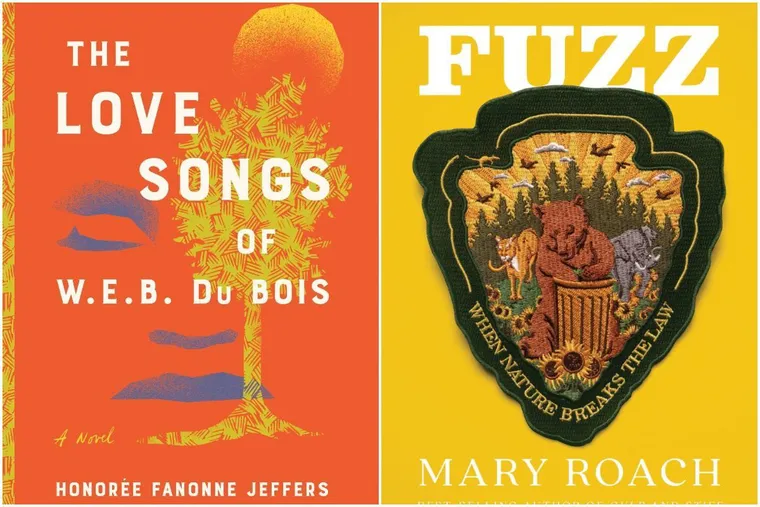Immediately after 9/11, network TV had a decision to make: Work the events into their storylines, or let their dramas and sitcoms exist outside the world in which the rest of us were suddenly living.
The first responders on Third Watch dealt with the tragedy directly while The West Wing did a special episode and moved on. The friends on Friends, despite living in New York City, famously let the moment pass unacknowledged. All options have their merits, storytelling-wise.
Now COVID is the crisis upending our everyday lives. It hasn’t yet made much of a dent in popular fiction. But when it does turn up, things get weird.
Example 1: The funny, ridiculous Kissing the Coronavirus romance series by M.J. Edwards, in which an ethically challenged virologist falls in love with COVID made flesh.
Example 2: The Guide by Peter Heller — a nature writer-turned-novelist skilled at planting earthy terms like tamaracks and berms into his outdoor adventure yarns. This time, however, a mutated coronavirus turns the book into part fly fishing tutorial, part dumb macho thriller.
A few weeks ago, Stephen King was on The Late Show with Stephen Colbert talking about how he’d planned to set his new novel, Billy Summers, in 2020, then pushed it back to 2019 so he wouldn’t have to incorporate COVID. “Writers are not going to be able to do that for long,” King admitted. “Sooner or later they’re going to have to deal with this thing head on.”
Until then, here are some excellent new books blessedly immune to our current strain of reality:
The Love Songs of W.E.B. Du Bois, Honoree Fanonne Jeffers. Long story short: Oprah’s right. This marvelously inventive, entrancing, ingenious novel is worthy of Ms. Winfrey’s book club and all readers with the emotional, intellectual, and physical stamina to pick it up. You’ll need both hands. In The Love Songs of W.E.B. Du Bois — 816 pages long and crowded with vivid characters living in multiple time periods — decorated poet/rookie novelist Jeffers weaves small tragedies and triumphs into the fabric of Black and Southern American history with grace and purpose. (Harper Collins, $28.99, out now).
Buy it now on bookshop.org | Borrow it from the Free Library
My Heart Is a Chainsaw, Stephen Graham Jones. Besides gentrification, podunk politics, urban legends, and underage drinking, 17-year-old Jade might be the scariest thing about Proofrock, Idaho. Locals (and readers) can’t ignore the manic outsider’s affinity for quoting slasher flicks and stomping around in a jumpsuit and Michael Myers mask. But in Jade’s mind there’s something more overtly evil stalking her tiny town, and she’s seen A Bay of Blood and the Scream movies enough times to know how to deal with it. Indigenous author Jones — who won a Ray Bradbury Prize for last year’s The Only Good Indians — keeps everybody guessing in My Heart Is a Chainsaw, a witty, terrifying, and freakishly touching literary maybe-horror novel that twists a fork in all the old slasher tropes. (Gallery/Saga Press, $26.99, out now)
Buy it now on bookshop.org | Borrow it from the Free Library
Harlem Shuffle, Colson Whitehead. Given Whitehead’s world-beating hot streak in the Serious Literature World — 2016′s The Underground Railroad and 2019′s The Nickel Boys each won Pulitzers — it may surprise some that the man Time Magazine calls “America’s Storyteller” would follow it up with a heist novel. But Whitehead’s no stranger to genre fiction (see 2011′s zombie-infested Zone One), and this is a book he’s been working on for years. Also, it’s not “just” a crime thriller. Set in the ‘60s and driven by family drama, Harlem Shuffle is every bit as smart, vivid, and memorable as his important books, and it’s also fun. (Doubleday, $28.95, Sept. 14)
Buy it now on bookshop.org | Borrow it from the Free Library
Matrix, Lauren Groff. Just about every list of 2021′s most-anticipated books included Groff’s latest, thanks to the critical and chart-topping success of 2015′s Fates and Furies. That was a good call. Matrix is the Florida-based author’s most daring work to date. Set in the 12th century, the novel follows teenage royal Marie de France as she is banished to a very poor (and very medieval) nunnery in Britain. Is it a dystopia or a utopia? Maybe both. Groff’s sumptuous but brisk storytelling mines the Dark Age abbey for veins of violence, humor, empowerment, and spirituality and forges something compelling, strange, and recognizable to modern eyes. (Riverhead, $28, Sept. 7)
Buy it now on bookshop.org | Borrow it from the Free Library
Fuzz: When Nature Breaks the Law, Mary Roach. It’s good fun to laugh at the 17th century Italians who charged caterpillars with trespassing, but modern “disagreements” between humans and animals are only slightly less absurd. For Roach — author of several funny popular science books including Stiff (about cadavers), Grunt (military tech), and Bonk (sex) — the dodgy subject of unlawful critters is a decent excuse to investigate anti-bear SWAT tactics in Reno, monkey birth control in India, and birds that ignore restricted airspace signs the world over. As usual, the author’s runaway-train curiosity lifts Fuzz out of the humor section and into wilder, more stimulating territory. (WW Norton, $35.95, Sept. 14)
Buy it now on bookshop.org | Borrow it from the Free Library
A Slow Fire Burning, Paula Hawkins. A late contender for best summer thriller by the author of The Girl on the Train and Into the Water. (Riverhead, $28, out now)
The Rise and Fall of Osama bin Laden, Peter Bergen. One of the few western journalists to have interviewed bin Laden personally, Bergen sums him up in this “definitive biography.” (Simon & Schuster, $30, out now)
Beasts Before Us: The Untold Story of Mammal Origins and Evolution, Elsa Panciroli. The Oxford paleontologist travels the globe in search of our earliest ancestors. We used to be moles, you guys. (Bloomsbury Sigma, $28, Sept. 7)
Beautiful World, Where Are You, Sally Rooney. The author of Normal People returns with an absorbing novel about sex, fame, worry, and doom in modern Ireland. (Farrar, Straus & Giroux, $32, Sept. 7)
Assembly, Natasha Brown. Race, class, and identity are the focus of this 112-page debut novel that critics are calling “powerful,” “provocative,” and “short.” (Little, Brown & Co., $23, Sept. 14)
Look for Patrick Rapa’s monthly roundup of great reads on Inquirer.com and in the Sunday Inquirer.
Credit: Source link






























